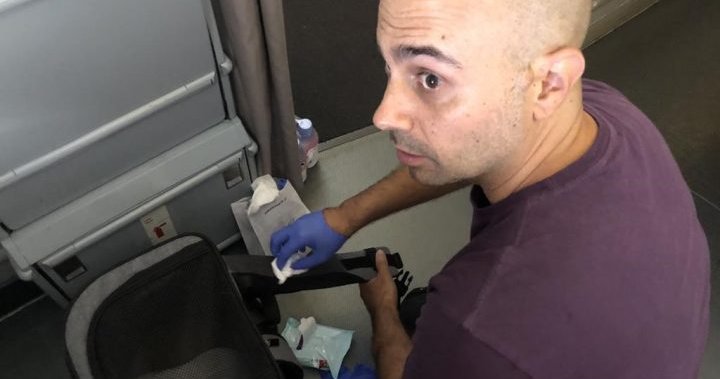TORONTO — Canada’s public health agency is investigating after a passenger on an Air France flight from Paris to Toronto said he sat amid the uncleaned remnants of a previous passenger’s hemorrhage.
The Public Health Agency of Canada said it is aware of what happened on the June 30 flight and cited its mandate to ensure that anything brought into the country on a conveyance does not threaten public health.
“Millions of travellers travel to, from, and within Canada each year. Given the close quarters travellers share for extended periods, environmental sanitation practices are especially important to reduce the risk of spreading communicable diseases,” the agency wrote in a statement.
Passenger Habib Battah said he was travelling with his wife and two cats on the eight-hour flight to Toronto when he noticed a strong manure-like odour and a large stain on the floor in front of his seat.
Initially thinking the smell was coming from his cats, which were in carriers, he got out of his middle seat and went on his hands and knees to check, he said. He realized one of the carriers was wet and noticed a large stain on the carpet.
Battah alerted cabin crew and said he was given cleaning supplies. After wiping the floor beneath his seat, the cloth came out “blood red,” he said.
“It all made sense to me because I know the smell of blood does smell almost like feces when it’s rotten,” he said.
Battah said cabin crew later told him someone had suffered a hemorrhage in his seat on a previous flight and that he could not change seats as the flight was full — instead they gave him latex gloves and more wet wipes.
“My instinct was I can’t sit with this. I can’t smell this. I have to get it off and no one was helping me do it. So, I just did it myself,” he said, adding that blood from the floor got on his shoes as well.
Later into the flight he was given blankets by cabin crew to put between his pet carriers and the blood-stained floor, he said.
“The blood on that floor, it was like a horror movie,” Battah, a journalist previously based in Beirut, said.
Battah said three days following his flight, Air France phoned him and let him know the blood was mixed with feces.
“I really think there’s a serious issue with the hygiene of aircrafts and there’s no oversight on that, it seems,” Battah said.
The Public Health Agency of Canada said bodily fluids like blood and diarrhea may contain microorganisms that cause disease and anything that comes in contact with them, “should always be considered as contaminated and should be handled with care so that diseases are not spread from one person to another.”
Habib Battah is seen on an Air France flight from Paris to Toronto in a June 30, 2023, handout photo, as he is cleaning blood off his pet carrier backpack that had transferred from the plane carpet from a previous passengers hemorrhage. Canada’s public health agency has opened an investigation after a passenger on an Air France flight from Paris to Toronto reportedly sat amid the uncleaned remnants of a previous passenger’s hemorrhage.
THE CANADIAN PRESS/HO-Habib Battah
John Gradek, a lecturer at McGill University who teaches aviation management, said that standards vary between airlines when it comes to acceptable levels of cleanliness.
Gradek presumes a conversation between flight attendants and crew occurred after Battah’s discovery before it was decided by the captain and crew that no emergency needed to be declared that would require the aircraft to be diverted to handle the situation.
“When you identify a biohazard issue on an airplane, it’s the reaction of the carrier that’s important. Does the airline consider it a biohazard,” Gradek said.
“If there’s somebody who missed the mark on this one, it really was Air France not declaring the seat area as a biohazard.”
Air France did not respond to a request for comment from The Canadian Press.
The airline told CNN in a written statement that a passenger on a flight on June 29 from Paris to Boston had been unwell, a “complete clean-up” of the area was requested, and the row of seats was made unavailable on the return flight from Boston to Paris.
Battah said Air France initially offered him $500 in compensation, which he said covered about 20 per cent of the flight’s original cost. He said he refused and is waiting for the airline to make him a better compensation offer.
“It was a horrific flight and it was a traumatizing flight,” Battah said. “They should have paid me to be on that flight, honestly, to sit in blood, not me paying them.”
© 2023 The Canadian Press



